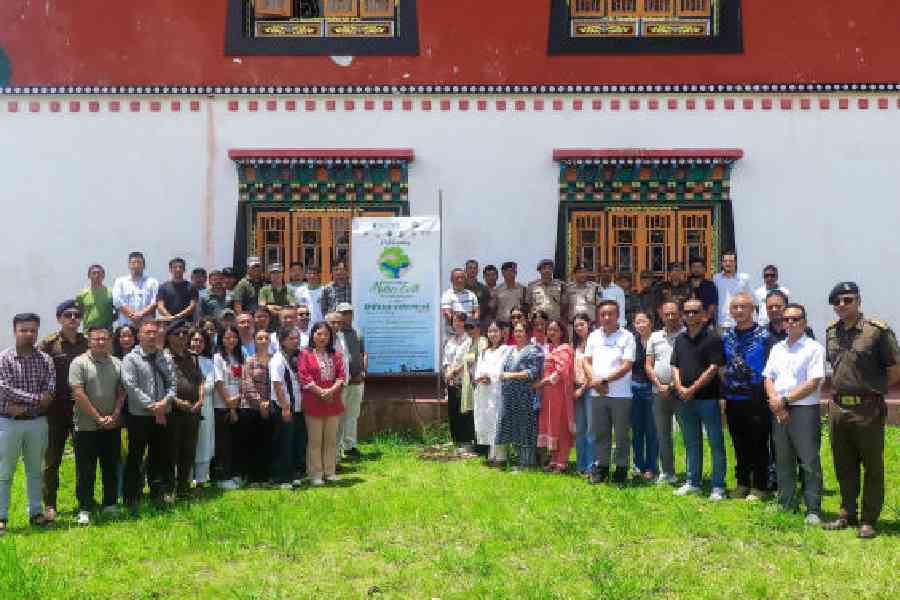Sikkim stood still for seven minutes on Monday morning as the Himalayan state collectively observed ‘A Day for Mother Earth’.
The gesture of halting all non-essential vehicular movement from 11am to 11.07am became the centrepiece of the day-long environmental campaign observed across the state as part of the two-week-long ‘Sikkim Paryavaran Parva’.
The theme of the environmental festival, running from July 1 to July 14, is ‘Leave a Green Legacy’.
Officials, schoolchildren, elected representatives and citizens from all walks of life joined a series of initiatives that marked the occasion on Monday.
“Individual efforts can collectively help combat global warming and climate change, and contribute to the well-being of Mother Earth,” said S.P. Bhutia, divisional forest officer (territorial), as he encouraged every participant to plant at least one sapling during the mass plantation drive held on the Kartok Monastery premises in Pakyong district.
The day’s most powerful image remained the state-wide pause in vehicular movement, a symbolic seven-minute stillness that brought traffic to a halt from the capital to the far-flung corners of the state. “The silence reminded us of the invisible damage of pollution and the value of conscious living,” said a senior forester.
Plants like areca palm, azalea, taki and jacaranda were planted on Tuesday. A signature campaign also followed, reaffirming participants' commitment to environmental and wildlife conservation.
Sources said saplings were planted by officials and volunteers in Soreng district.
The plantation event also included Sikkim’s flagship eco-programmes, Mero Rukh Mero Santati and Ek Ped Maa Ke Naam, linking environmental action to a sense of emotional responsibility. “These programmes not only encourage tree planting but also deepen the symbolic bond between individuals and nature,” said a senior official.
Further east, a large-scale plantation drive was conducted along a highway from 3rd Mile to 15th Mile near Gangtok.
Organised by the tourism and civil aviation department in coordination with the forest and environment department, Checkpost police, panchayati raj institutions and the JN Road Taxi Drivers-cum-Owners Association, the initiative saw enthusiastic participation by local communities and government officials alike.
MLA and advisor to the health and culture departments, Thenlay Tshering Bhutia, who attended the Gangtok event as the chief guest, praised the inter-departmental coordination and local involvement. “This plantation marks a significant moment for the constituency. It reflects a shared responsibility towards sustainable practices,” he said.
Additional chief secretary of tourism and civil aviation, C.S. Rao, emphasised the synergy between tourism and ecology, noting that the plantation was designed to complement the forest department’s conservation efforts. “We have maintained over 47 per cent forest cover in the state. This initiative uses zonal planting patterns, with each 1–2 km stretch showcasing a single species, adding to the floral uniformity and appeal along the highway,” he said.
Additional director, the tourism and civil aviation department, Tenzing Gelay Bhutia, said the plantation was part of a pilot project to develop the highway as a green tourism corridor. “Our department will take full responsibility for long-term care and monitoring,” he assured. He also acknowledged the role played by the drivers' association and residents in planning and execution.











